Introduction to IFRS S1 and IFRS S2
IFRS S1 and IFRS S2, also known as "General Requirements for Disclosure of Sustainability related Financial Information" and "Climate related Disclosures" respectively, is part of the ISSB's goal to enhance the transparency in sustainability-related data in financial reports.
These standards have been designed to empower investors and creditors in making well-informed decisions regarding resource allocation to organisations.
Effective Dates
Both IFRS S1 and IFRS S2 will be applicable for annual reporting starting from January 1, 2024, and financial reports based on these standards will come into effect in 2025. While the ISSB encourages companies to adopt these standards voluntarily, it will be up to countries themselves to determine whether both standards will be mandatory in the future.
In Australia, the Australian Accounting Standards Board is using IFRS S1 and IFRS S2 to develop the Australian Sustainability Reporting Standards. These standards are still in development and are open for comment till 1 March 2024.
Key Objectives of IFRS S1
The primary objective of IFRS S1 is to encourage businesses to disclose information about sustainability-related risks and opportunities. This disclosure will prove valuable to those who use general-purpose financial reports, aiding them in resource allocation decisions like if they should invest in a business. Sustainability-related risks and opportunities will include factors that could be expected to affect an organisation’s cash flows, access to finance, or cost of capital.
Key Components of IFRS S1
Let’s take a look at the main elements of IFRS S1 set to be enacted on 1 January 2024:
- Governance - This section involves the disclosure of a businesses governance processes, controls, and procedures for sustainability-related risks and opportunities.
- Strategy - Businesses must outline their strategies for managing sustainability-related risks and opportunities.
- Risk Management - IFRS S1 requires the disclosure of processes that identify, assess, prioritise, and monitor these risks and opportunities. Importantly, it highlights the integration of risk management into an entity's overall risk management system.
- Metrics and Targets - Businesses must report on their sustainability-related risks and opportunities performance, including progress towards any targets set by the business or required by law or regulation.
The Objectives of IFRS S2
IFRS S2, also referred to as the "Climate related Disclosures," aims to ensure that organisations disclose relevant information regarding risks and opportunities linked to climate change. This disclosure is for individuals who rely on general financial reports to make informed decisions such as whether or not to invest in a business.
Key Components of IFRS S2
Let’s take a look at the main components of IFRS S2 and how it differs to IFRS S1:
- Governance - IFRS S2 ensures the disclosure of governance processes, controls, and procedures used by entities to monitor, manage, and oversee climate-related risks and opportunities.
- Strategy - Businesses must clearly explain their approaches to managing climate-related risks and opportunities. This section also requires disclosure of the impact of these factors on an entity's business model.
- Risk Management - This focuses on the processes used to identify, assess, prioritise, and monitor climate-related risks and opportunities. It focuses on data sources, the scope of operations, scenario analysis, and integration into risk management systems.
- Metrics and Targets - IFRS S2's metrics and targets section covers greenhouse gas emissions, capital invested in climate-related risks and opportunities, and the use of carbon credits for reducing emissions.



















